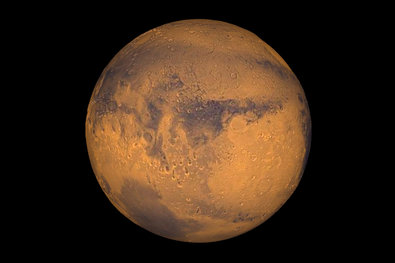
   |

What Science Fiction Movie or Novel Is Most Prescient Today?
This year, NASA confirmed the existence of liquid water on Mars, raising the possibility of Martian life; a genetically engineered animal can now be sold for human consumption, as in a tale by Margaret Atwood; and a Silicon Valley research institute was formed to create a computer with the intellectual ability of a human, and to confront the threat such artificial intelligence poses to humanity. Scientific discovery and invention often leads to comparison with speculative or dystopian fiction. What science fiction movie or novel seems most prescient today?
* confirm = 사실임을 보여주다[확인하다]/ Martian life = 화성 생명체/ genetically engineered = 유전자 공학[조작]에 의해 생성된/ human consumption = 식용/ intellectual ability = 지적 능력/ confront = 맞서다/ threat = 위협, 협박/ artificial intelligence = 인공 지능/ pose = (위협, 문제 등을) 제기하다/ speculative = 추측에 근거한/ ddystopian = 반(反)이상향의/ prescient = 선견지명[예지력]이 있는 ![]() 어떤 공상 과학 소설 또는 영화가 오늘날 가장 예지력이 있어 보이나요?
어떤 공상 과학 소설 또는 영화가 오늘날 가장 예지력이 있어 보이나요?
1. ‘Fahrenheit 451’ by Ray Bradbury
Bradbury eerily predicted the Internet: The book imagines a world flooded with information that deluges citizens through ear buds and wall-sized flat-panel screens.
2. ‘The Martian’ by Andy Weir
The journey to Mars is the next great questing adventure in humanity’s centuries-long odyssey outward — if our species manages to avoid environmental and socio-economic trouble at home.
3. ‘The Fifth Season’ by N.K. Jemisin
Though we have plenty of stories about the physics of space travel and the biology of alien life, very few tackle the actual rocky, gassy, molten stuff that planets are made of.
4. ‘The Body Snatchers’ by Jack Finney
It’s scary enough in fiction, but even in 2015, modern day “body snatchers” in state legislatures and Congress are trying to take over women's bodies.
5. ‘Book of the New Sun’ by Gene Wolfe
This fictional universe has fallen backwards, from fear, into inscrutable religious ritual, mistaking technology for magic and, worst of all, elevating torture to spiritual ecstasy.
6. ‘Use of Weapons’ by Iain Banks
The best kind of science fiction, which is always about us in the here-and-now, provides the distance needed to see ourselves more clearly.
Sample Essay
‘Fahrenheit 451’ by Ray Bradbury
Technological prescience in science fiction usually requires an author with luck. Societal prescience requires a poet.
Ray Bradbury, that lucky poet, wrote "Fahrenheit 451" in 1953, and yet it speaks directly to today. In terms of technology, Bradbury accurately extrapolated, from that era’s nascent television culture, something that eerily predicts the Internet: The book imagines a world flooded with information, pouring into citizens’ ears and eyes through ear buds and wall-sized flat-panel screens.
Bradbury also off-handedly refers to touch-activated locks and ATMs as well as autonomous unmanned aerial drones. His “hound,” a sinister tracking robot that can be personally tuned to an individual’s unique chemistry, doesn't sound so far off.
More important, Bradbury’s exploration of the future of society intuited that the burgeoning “many” would lead to isolating disconnect for the individual, with disastrous results: In the book, Guy Montag's wife is driven by her existential ennui into a suicide attempt.
Montag is warned, “Those who don't build must burn. It's as old as history and juvenile delinquents.” Sadly, we see this in the incomprehensible murderous actions of today in Connecticut, San Bernardino, Paris and countless other cities.
Bradbury’s descriptions of a devolving education system also creepily echo today’s “teach to the test” frenzy in public schools. “Chock them so damned full of 'facts' they feel stuffed, but absolutely 'brilliant' with information. Then they'll feel they're thinking, they'll get a sense of motion without moving,” says Montag’s boss, Captain Beatty.
Beatty's assertion that “the word ‘intellectual’ became the swear word it deserved to be” seems astonishingly prescient during this run-up to the 2016 presidential election. “The television," remarks Faber, a retired English professor, "tells you what to think and blasts it in. It must be right. It seems so right. It rushes you on so quickly to its own conclusions your mind hasn't time to protest, 'What nonsense!'”
Indeed.
Yet there is hope. Amid apocalyptic dystopia, "Fahrenheit 451"’s protagonist retains sparks of curiosity, creativity and courage, and these human characteristics are the seeds of hope that can arise, phoenix-like, from civilization’s ashes. Bradbury would have us nurture these characteristics in ourselves, our communities and, most important, our children. In the book, Montag is warned, “Don’t look to be saved in any one thing, person, machine or library. Do your own bit of saving, and if you drown, at least die knowing you were headed for shore.”
Bradbury’s prescience regarding the fire of the human spirit should give us comfort, because his prescience about technology and the dark side of demagoguery was so remarkable.
   |




